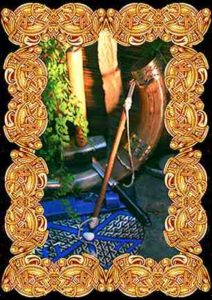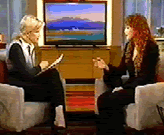 Northern Magic
Northern Magic
Lesson 1
Today’s Teutons
The chapters in Edred Thorsson’s book, Northern Magic, are not numbered. To make taking these lessons a lot less confusing, we recommend you turn to the Table of Contents in Northern Magic and write in some numbers to the left of each chapter name. Number them from 1 to 12. Quick and easy step which will save you agonies in the future. <grin>
LESSON ONE
Please read the Introduction and Chapter One in the book Northern Magic by Edred Thorsson, the essay below, then answer the questions at the end.
ESSAY: TODAY’S TEUTONS
The Teutons, stated simply, are people who speak the Germanic group of languages.Teutonic and Germanic mean the same thing, but people often prefer to say Teutonic because it ends the confusion between being Germanic and being German.Gothic can also refer to the Teutonic and Germanic traditions, although originally it referred to only one sect of the Teutonic tradition. The English,German, Dutch, Icelandic, Danish, Norwegian, and Swedish people are all descended from the ancient Teutonic tribes. They also left their mark on France, Spain,and Italy.
After the destruction of the Roman Empire, the Ostrogoths and Longobards established medieval kingdoms in Italy. The Visigoths set up kingdoms in Spain and Southern France, and the Vandals also established kingdoms in Spain.The Franks settled in Northern France, and they are the reason the country came to be named France.
[As a side note, it is thought that the Magdala and several of the other disciples of Yeshua (Jesus Christ) went to Southern France after Yeshua’s Ascension. It’s highly possible that they learned the traditions of the Northern Way while there, and also that they taught those people some of their own magiks, the Magiks of the Rose.]
Back on track.
The Teutons had a unique religious and magical system – particularly rune magic – that had some similarity to the religions of the Celts, Slavs, Romans,Greeks, Persians, and Indians, but were otherwise unique to the Teutons.The magical and religious teachings of these people were contained in ancient texts known as the Eddas, which have a prose and poetic version.
There were many other sources of the tradition, but they were unfortunately destroyed by Christian missionaries. The traditions that survived were those of the god Woden and of the goddess Freyja. These traditions are the birthright of many reading this article – the English-speaking people.
There are several distinct kinds of Teutonic “magicians.” The first is the godhi [gydhja – female], which is really more of a priest [priestess]. The other two magicians are the galdor and the seith. They can both be known as vitki, meaning wise one. Godhi and gydhja can also be spelled Gothi and Gythia which are close to their pronunciation. The “th” is pronounced hard as in the word “the” and “this.” NOT soft as in “thistle” and “with.”
A practitioner of the true Northern Way must have a period of preparation,a learning of the lore and ways of the Ancestors and Gods, our Elder Kin,before becoming a vitki. A Teutonic magician usually works alone or in small groups, except for “true” traditionalists, who seek to involve the whole community.
The Teutonic magician usually identifies himself or herself with a god-form- usually Woden or Freyja – for initiatory purposes. Woden is the major god of galdor and rune magic. The galdor usually delves deep into the mysteries of the mind and spirit. The highest aim of a galdor is self-transformation.
Freyja is the goddess of the seith. This is a form of Norse Shamanism, concerned with the mysteries of mind and flesh. The seith seek to link intuition with the flesh.
Together, these two make up the vitki, truly the wise ones. –Essay by Mark Raines
QUESTIONS
Copy and paste the following questions into an e-mail, answer them, and send them to Mystery School with the subject line reading: “Northern Magic Lesson 1 from ____________ (your magikal name)”
1. T/F – Teutons speak the Germanic languages.
2. List two other words synonymous with “Teutonic.”
3. T/F – The Teutons left their mark on France.
4. List two other countries the Teutons left their mark on.
5. T/F – The Teutonic religion is unique.
6. List the Teutonic countries mentioned in this chapter.
7. Where are your own ancestors from? If you are a “regular”English-speaking American, you are really a “European-American.” There are Italian-Americans, African-Americans, Irish-Americans, Jewish-Americans,Hispanic-Americans, and Asian-Americans all of which have their ethnic pride and special holidays, religions. European-Americans (Teutonic and Celtic)can have ethnic pride, too, and it is NOT racism. Racism is when you think your race is superior to all the others, and actually hate other human beings who don’t look like you or who aren’t of your race. Simply taking pride in your heritage and ancestral culture is NOT racism, though many try to jump on anything “white” people do or say or teach that remotely relates to culture,heritage or ethnic pride. The question we’d like you to answer here is, how do you feel about racism and ethnic pride? Do you think it’s important for people to connect with, or at least study, their specific ancestral religion—is it truly in our DNA? Thorsson calls the Northern Way the “most natural organic” religion for people whose mother tongue is English (you and me). Have you ever directly encountered this strange discouragement against European-Americans and Anglo-Saxons to express their cultural pride?Has anyone ever called you racist or have you ever shut yourself up lest you be thought racist?
8. Loaded Question: Is it possible to be a Christian AND practice the older religion of the Teutons, Celts or other pre-Christian “pagan” peoples?Consider how the Teutons felt when Christianity came up from Rome and they were strongly pressured (many by the threat of the sword) to convert. Some did indeed embrace the New Faith from the East because they found similarities in God-the-Father and Yeshua to their own gods. For awhile, almost 200 years,there was a Dual Faith period. But slowly our ancestors ended up losing all their original gods and especially their goddesses, although many customs such as Christmas Trees and Easter Fertility Eggs still remain. So what about now? Is it possible to be a Christo-Teuton? A Christo-Pagan, or a Christo-Celt (Druid)? Many would say no way, others would say they don’t know. But what do YOU think? Tell why or why not. We ask this question because we all live in a de facto Christian culture, and face it —you were brought up in it,too. To reconcile all of this peacefully and avoid religious resentment and downright religious war is the goal here. The gods know there are enough religious wars and resentments in the world today.
–Questions by Mark Raines & Dr. Katia

